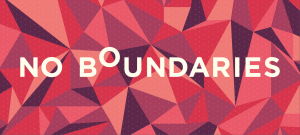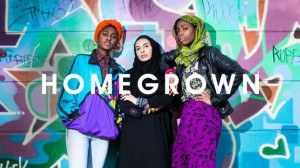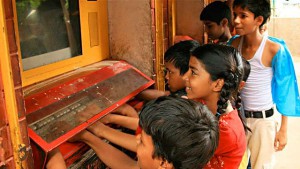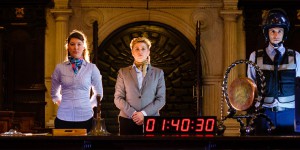One of the nice things about Future Producers is that, occasionally, you get to pretend to be a fully-fledged member of Watershed staff. As I sidled surreptitiously into a staff live screening of No Boundaries, there was a mix of friendly waves and bemused glances. I probably read too much into them, the Watershed is a big place.
Bit of background: No Boundaries is an annual conference for the arts, where delegates and speakers from across the world come together to ask questions, spark provocations and chat over lunch. Provocation is the big word here, between 450 delegates and about 43 contributors, there’s a lot of exciting thinking and discussion, but nobody’s there to give you definitive answers. This is the arts, godammit! We’re not here to tell you what you should and shouldn’t believe!
The conference is hosted by Watershed (here) and HOME (Manchester) and is live broadcast to both venues, as well as for free, online. It’s terribly impressive. As the Bristol-dwelling child of a Mancunian mother, I appreciated flitting between the two. Like Skyping my grandad, and asking him what he thought about cultural financial policies. Anyway,
It’s fitting that each session was titled with a question, which each speaker didn’t really answer. In the sessions that I sat in on, everyone agreed that we probably can’t ‘Exercise Freedom of Expression’ at the moment but that it’s all relative and we should be doing a lot about it; We agreed that in some ways we are ‘Nurturing Tomorrows Talent’, but mostly we’re missing out, and we should be doing a lot about it; And nobody agreed on ‘How the Money Flows’ and we should be doing a lot about it.
You can watch all of these discussions and more online, but in case you’d like the cliff notes, keep reading.
Can We Exercise Freedom of Expression?
Jen Bell gave a short introduction to this section to talk about her project ‘The Babel Choir’. She’s been interviewing people in the houses of parliament, from politicians to cleaners, in an attempt to find out what Britain would look like as a choir. She suspects that it would look nothing like our government. She spoke with great passion about the importance and power of voice, as a political tool, and she just so happens to be a resident at PM Studio.
Julia Farrington, of Index on Censorship, kicked things off with a comprehensive and extremely disquieting examination on the growing culture of policing, policing of culture. Pre-emptive censorship, especially by the police, seems to be a growing trend that was touched on throughout this session.
Basma El Husseiny spoke about Culture Resource, and the work they do to give refugees the opportunity to not only express themselves creatively, but to turn creative skills into legal forms of income. What really struck me was the practical advocacy she showed for the arts, in situations where freedom of expression is supposedly paramount.
Vasif Kortun reminded us that even the director of research and programs at SALT can still get confused by Skype, and provided us with a powerful metaphor for cultural institutions. ‘Monasteries’ were organisations “were discussing boundaries within boundaries”, and ran the risk of ‘ruling’ over their introverted cultural output. ‘Public Squares’ however, institute radical ideas with no clear outcomes, and allow opportunities to “hatch outside of the boundaries”. No Boundaries, see?
Natalia Kaliada comes from one of my favourite companies, Belarus Free Theatre, and is a political refugee of her own country. Her practice and personal story seem better suited to an intrepid investigative journalist –working underground, smuggling her children out of school and exposing human rights violations left right and centre, but it’s testament to her theatrical skill and charisma that this 10 minute talk was one the of funniest of the day. She reminded us that, as a person from a political dictatorship, she is not simply an exotic example of the marginalised other, but the person best placed to expose the injustices of seemingly free countries. She pointed out the problematic use of the word ‘responsible’ in the description of this session on freedom of expression. Excuse me for gushing, I could go on.
Nadia Latif wore a really excellent jacket, and was at the helm of Homegrown, the play that the National Youth Theatre commissioned about Islamic radicalisation of young people, and then cancelled without warning. Again, this appears to be a story of pre-emptive censorship, but the lack of transparency, engagement and even basic understanding that these decisions were made with was baffling. Nadia Latif, Julia Farrington, a Priest, an ex-Guantanamo Bay detainee and Matt Frei (not the start of a long winded joke) will be looking at the similarities between Homegrown and Martyr (which has just run at Bristol Old Vic).
Finally, journalist Nick Cohen gave us a refreshingly blunt take on political correctness, and the problematic binary we tend to apply to right-wing and politically correct. One quote that stuck with me was “How I hate the word inappropriate, and how it’s thrown around nowadays. It reeks of Victorian drawing rooms”.
Clare Reddington then had to be “the person that cuts the speakers short on ‘Freedom of Expression’”. We all chuckled.
Are We Nurturing Tomorrow’s Talent?
Alice Webb gave us a really impassioned talk (AND MONTAGE) about the work that BBC does for young people. I was genuinely surprised at how progressive, inclusive and far reaching their work is. Kids today see documentaries about transgender young people and make DIY apps! I remember making an octopus out of wool one time.
Reece Williams, of Contact Theatre‘s The Agency, trumped everyone by actually bringing a young person. It was great to see the parallels between this project and Future Producers, especially in the breadth of work they produced. Rosemary Davis (aforementioned young person) spoke about the new confidence she’s instilled with because of the programme, and hearing her talk about the work she does felt like seeing the beginnings of a real leader.
Jacqui O’Hanlon, of RSC, spoke about how even the national representatives of an artist whose work is a compulsory part of the curriculum have a difficult time engaging with schools. Part of this is their dedication to work with as diverse a selection of these schools as possible, in an effort to allow everyone to feel confident engaging with culture. I was reminded of a presentation workshop we did at the beginning of Future Producers, where, when tasked with discussing the role of culture, I went off on a rant about how young people are the custodians of culture, and how we rarely feel entitled to the role.
Jackie Kay is just about the loveliest person alive, and to hear her talk in full circle about how she began writing to represent herself, to meeting young women who felt represented by her writing, was incredibly inspiring. It was also fun to hear, as a contemporary poet taught on the Scottish curriculum, students had a very real, and often very frank twitter relationship with her. It’s probably a good think we can’t tweet Shakespeare, he’d be one of those people that tries to force a hashtag he’s made up.
Professor Sugata Mitra pioneered the laptop Hole in the Wall experiment, and won the TED Prize for his work to build a School in the Cloud. What does all of that mean? Basically, he believes that in the age of the internet, it’s time to start allowing children to teach themselves. It’s hard to disagree with him, standardised tests are a mockery of the ethos that teachers are trying to uphold, but perhaps more unsettlingly, Sugata reminds us that when the car overtook the horse and carriage, it wasn’t just the horses that were defunct, but the driver. Very, very provocative stuff.
How Does the Money Flow?
Professor Ian Hargreaves, co director of REACT and general creative enconomy wizard, took us on a tour of the economics of the creative industry, and echoed the quiet mantra of the day: Invest in People, as only people can be creative. His treatment of David Cameron’s clumsy attempts to include the word ‘creativeness’ in his speeches made me think of Don’t Hug Me I’m Scared. Brownie points Ian Hargreaves.
Then John Knell came and ripped the roof off with financial firestorm. Getting back to basics, he reminded us that within the arts our intentions are almost always the same, but our means tend to pit us against each other. I particularly enjoyed his assertions that arts organisations need to be facilitators, not gate keepers – to champion their work, not themselves. I work for Theatre Bristol, and a core principle of their work is that once they are successful, they will no longer be needed. I felt a warm glow of pride.
Moira Sinclair, of the Paul Hamlyn Foundation, gave us an excellent perspective from the funder, rather than the other way around. It was great to hear such similar attitudes from both sides, primarily, encouraging collaboration rather than competition. Essentially, stop saying “Why did they get funding? I’m better than them!”
Dr Maria Balshaw was asked to provoke, and she began by giving us a rundown of the general consensus of the attitudes towards Manchester’s recent apparent surge in misguided, damaging funding. Thankfully, she disagrees. She continued the chant of “stand together, don’t squabble” and championed the work of dynamic, cultural innovators in Manchester. She asked why there wasn’t a shared cultural calendar and booking system across Manchester, and suggested that organisational ego was a big factor, surely engaging with one arts organisation makes engaging with others more likely. One rhetorical question she threw out was “Are there examples of large scale arts investments the caused everything else to fail?”.
And then I had to go…
I’m catching up on what I missed at the Watershed now, as I type this blog, and YOU CAN TOO! How exciting. I’m really looking forward to Theaster Gates and David Lockwood
The whole energy of the day was really exciting; here were some of the biggest cultural movers and shakers in the country, coming to be challenged, to have difficult conversations, and, to chat over lunch. The fact that this is live broadcast across the world speaks to the respect for community and transparency that this industry recognises it needs to champion.
Also, if you look closely, you’ll spot Jess weaving about taking photos. #celeb